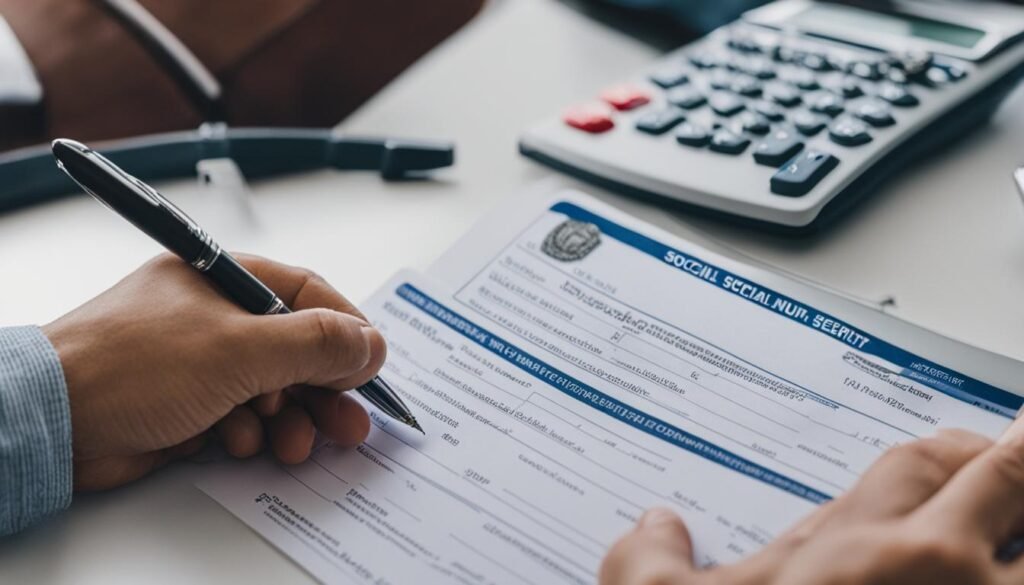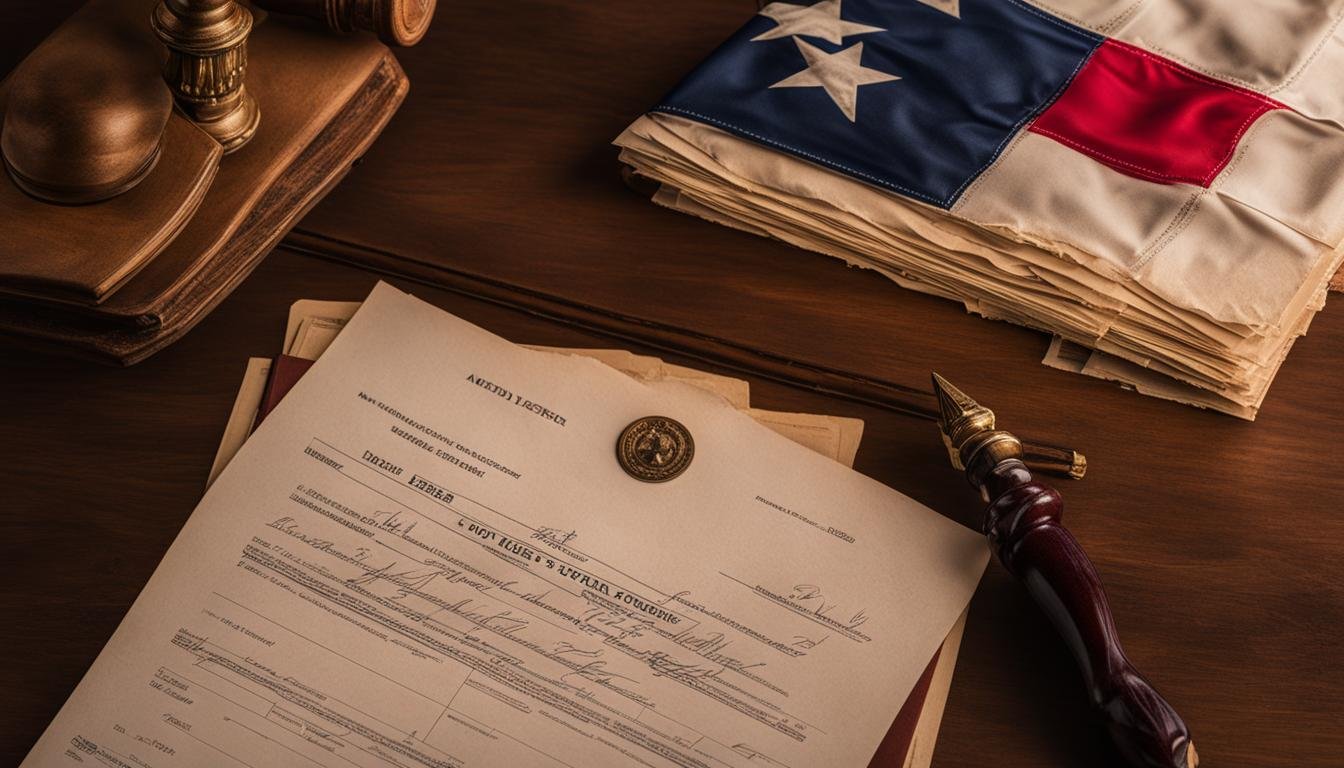As a newcomer in Texas, it’s important to take care of your legal documentation to ensure a smooth transition and compliance with state requirements. Whether you’re moving for work, education, or simply a change of scenery, having the necessary legal documents is crucial.
Establishing residency, obtaining a driver’s license, and proving your identity are some of the key legal steps you’ll need to take as a newcomer. These documents not only validate your presence in the state but also enable you to access various services and benefits.
In this article, we’ll explore the essential legal documents you need as a Texas newcomer, including driver’s licenses, identification cards, proof of residency, and more. By understanding these requirements and gathering the necessary documentation, you can navigate the Lone Star State with confidence.
Key Takeaways:
- Texas newcomers must obtain essential legal documents to settle in the state.
- Driver’s licenses, identification cards, and proof of residency are vital for establishing your presence in Texas.
- Applying for a Texas driver’s license or identification card requires proof of residency and identity.
- Social Security Numbers (SSNs) are necessary for accessing various services and benefits.
- Newcomers must provide legal residency and immigration documentation.
Texas Driver License and Identification Card Requirements
When you’re new to Texas and need to get a driver’s license or identification card, there are certain requirements you must meet. These requirements ensure that you establish your residency in the state and adhere to the regulations set forth by the Texas Department of Public Safety.
One of the primary requirements is proving your residency in the state for at least 30 days. This is essential to ensure that you are a legitimate resident of Texas and eligible for a driver’s license or identification card.
To meet the residency requirements, you will need to provide specific documents as proof of your address in Texas. The acceptable documents include:
- A deed or mortgage for your property
- A utility bill in your name
- An insurance policy with your Texas address
These documents serve as evidence of your residency and must be presented during the application process. It’s vital to have these documents ready when you visit the Texas Department of Public Safety.
Remember, having a valid Texas driver’s license or identification card is not only a legal requirement but also serves as an important form of identification for various purposes in the state.
For more detailed information on the specific requirements and documents needed for obtaining a Texas driver’s license or identification card, refer to the official website of the Texas Department of Public Safety.
Important Note:
Ensure that all the required documents are up to date and relevant. Inaccurate or expired documents may result in delays or difficulties in obtaining your Texas driver’s license or identification card.
| Required Documents | Description |
|---|---|
| Deed or Mortgage | A legal document proving property ownership in Texas |
| Utility Bill | A recent bill from a utility company under your name and Texas address |
| Insurance Policy | A valid insurance policy with your Texas address |
Obtaining Social Security Number
Texas newcomers should apply for a Social Security Number (SSN) to access various services and benefits. The Social Security Number is a unique identification number issued by the Social Security Administration. It is essential for employment, taxation, and government benefits.
To obtain an SSN, individuals need to complete an application with the Social Security Administration and provide supporting documentation. These documents are required to verify identity and immigration status.
Application Process
The application process for a Social Security Number is straightforward. Texas newcomers can follow these steps:
- Download the SS-5 form from the official Social Security Administration website or request it from the nearest Social Security office.
- Complete the form accurately and legibly. Pay close attention to the required fields.
- Gather the necessary supporting documents. These may include:
| Required Documents | Accepted Types |
|---|---|
| Proof of identity | Valid passport, driver’s license, or state-issued identification card |
| Proof of immigration status | Valid employment authorization document (EAD), permanent resident card (green card), or visa |
It is important to note that original documents or certified copies are required. Photocopies or notarized copies will not be accepted.
Once the application and supporting documents are ready, newcomers can submit them to the nearest Social Security office. They can also apply by mail or online, depending on their eligibility and preference.
After processing the application, the Social Security Administration will mail the Social Security Number card to the applicant’s address.
“Applying for a Social Security Number is a crucial step for Texas newcomers. It provides access to a wide range of benefits and services, including healthcare, retirement, and disability benefits. Make sure to submit accurate and valid documentation to avoid any delays in the application process.” – John Smith, Social Security Expert
By obtaining a Social Security Number, Texas newcomers can fully integrate into the state’s social and economic systems. It is an essential component of establishing legal residency and accessing various resources for a successful transition.

Legal Residency and Immigration Documentation
Newcomers in Texas must establish their legal residency and provide appropriate immigration documentation to comply with state requirements. Here are some essential documents you may need to provide:
- Texas Residency Affidavit: To prove your residency in Texas, you may need to complete and submit a Texas residency affidavit. This document verifies that you live in the state and can be obtained from the Texas Department of Public Safety.
- Documents Issued by U.S. Military or Veterans Administration: If you have served in the U.S. military or are a veteran, you may need to provide documents such as a DD-214 form or military ID card to establish your legal residency in Texas.
- Concealed Handgun License: In some cases, a concealed handgun license can serve as proof of legal residency in Texas. This document is issued by the Texas Department of Public Safety and can only be obtained if you meet the eligibility criteria.
- Immigration Documents: Depending on your immigration status, you may need to provide various types of immigration-related documents, such as a permanent resident card (green card), work visa, student visa, or other relevant documentation. These documents are essential to prove your legal residency and status in the United States.
It is important to note that the specific documentation requirements may vary based on individual circumstances and the type of residency or immigration status you hold. Always consult the Texas Department of Public Safety and other relevant authorities to ensure you have the correct documentation for your specific situation.
Understanding and fulfilling the legal residency and immigration documentation requirements is crucial for newcomers in Texas. By providing the necessary documentation, you ensure compliance with state regulations and establish your legal status in the state.
Property Ownership and Rental Documents
Texas newcomers who own property or rent a residence are required to provide proof of their ownership or rental agreement. This includes essential property ownership documents and rental agreements that validate their residence in Texas.

When it comes to property ownership, documents such as a deed or mortgage statement serve as evidence of ownership. Homeowners can also present their homeowner’s insurance policy to validate their residency.
For those renting a residence, a residential lease agreement is a crucial document that establishes the terms and conditions of the rental. Tenants can also provide their renter’s insurance policy as proof of their residence in Texas.
By presenting these property ownership documents and rental agreements, newcomers in Texas can fulfill the necessary legal requirements and demonstrate their proof of residence.
Vehicle Registration and Auto Insurance
Newcomers in Texas must adhere to vehicle registration requirements and possess valid auto insurance. Ensuring compliance with these regulations is essential for the smooth operation of vehicles within the state. Let’s explore the necessary steps to register your vehicle and provide proof of auto insurance.
Registering Your Vehicle
Registering your vehicle in Texas is a straightforward process that involves submitting specific documents to the Texas Department of Motor Vehicles (DMV). The documents required for vehicle registration may include:
- Proof of ownership, such as a valid title or Manufacturer’s Certificate of Origin (MCO)
- Proof of identity, such as a valid driver’s license or identification card
- Evidence of passing a vehicle safety inspection, if applicable
- Proof of Texas vehicle insurance
- Form VTR-130U, Application for Texas Title and/or Registration
It’s important to note that the specific requirements for vehicle registration may vary depending on factors such as vehicle type, ownership type, and your individual circumstances.
Proof of Auto Insurance
Proof of auto insurance is mandatory in Texas, and newcomers must provide valid documentation to demonstrate compliance with this requirement. Acceptable forms of proof of auto insurance may include:
- A current and valid automobile insurance policy or statement
- A current and valid vehicle payment booklet
It is crucial to obtain auto insurance from a licensed insurance provider that meets the minimum liability coverage requirements defined by the state of Texas. Failure to provide proof of auto insurance may result in penalties and legal consequences.
“Obtaining auto insurance and registering your vehicle are essential steps for newcomers in Texas to legally operate their vehicles and protect themselves financially in the event of an accident or incident.”
Educational and Employment Documents
As a newcomer in Texas, it is essential to provide the necessary educational and employment documents when needed. These documents serve various purposes, such as enrolling in school or applying for a job. By ensuring you have these documents ready, you can smoothly transition into the educational and professional landscape of the Lone Star State.
When it comes to educational documents, you may be required to provide proof of your academic background. This can include documents such as your Texas high school or college report card, transcripts, or certificates of completion. These records showcase your educational achievements and provide evidence of your qualifications.
Additionally, employment records play a crucial role when seeking job opportunities in Texas. Potential employers may request documents that validate your previous work experience and skills. Examples of employment documents include paycheck stubs, tax forms, or W-2 forms. These records verify your employment history and demonstrate your commitment to your career.
It is important to keep these documents updated and easily accessible. Having them readily available can save you time and streamline the process of enrolling in school or applying for employment opportunities. By organizing your educational and employment records, you can present yourself as a well-prepared and professional candidate.
Required Educational and Employment Documents
| Educational Documents | Employment Documents |
|---|---|
| – Texas high school or college report card | – Paycheck stubs |
| – Transcripts | – Tax forms |
| – Certificates of completion | – W-2 forms |
Having these documents in order will not only help you meet the necessary requirements but also make a positive impression on educational institutions and potential employers.

“Education is the passport to the future, for tomorrow belongs to those who prepare for it today.” – Malcolm X
Financial and Governmental Documents
Texas newcomers may be required to provide financial statements and governmental documents as proof of their affiliation. These documents serve as valuable evidence of an individual’s financial standing and governmental ties, ensuring compliance with legal requirements.
Gathering the Required Documents
When preparing the necessary financial and governmental documents, newcomers should gather the following:
- Bank Statements: Recent bank statements provide a comprehensive overview of an individual’s financial transactions and account balances, highlighting their financial stability.
- Credit Card Statements: Credit card statements demonstrate an individual’s credit history and financial responsibility, further substantiating their financial standing.
- Utility Bills: Recent utility bills, such as electricity, water, or gas bills, serve as proof of residence and can establish an individual’s ties to a specific address.
- Voter Registration Cards: Voter registration cards confirm an individual’s engagement in the democratic process and their eligibility to participate in local, state, and federal elections.
- Government-Issued Documents: Various documents issued by federal, state, county, or city government agencies can serve as additional proof of governmental affiliation. These may include tax forms, identification cards, permits, or licenses.
By assembling these financial statements and governmental documents, newcomers can demonstrate their residency, financial stability, and affiliation with government institutions in Texas.
Example of Financial and Governmental Documents
| Document Type | Description |
|---|---|
| Bank Statements | Recent bank statements from a Texas-based financial institution, demonstrating regular account activity and a positive financial standing. |
| Credit Card Statements | Statements from a major credit card provider, showcasing responsible usage and timely payments to further support financial credibility. |
| Utility Bills | Recent electricity and water bills from a recognized utility company, confirming residency and the length of stay at a specific address. |
| Voter Registration Card | Official voter registration card issued by the Texas Secretary of State, signifying active engagement in the democratic process and the ability to vote in elections. |
| Government-Issued Identification | Texas driver’s license or identification card issued by the Texas Department of Public Safety, providing a government-issued form of identification. |
These documents exemplify the types of financial and governmental documents that may be required by Texas authorities to verify an individual’s financial and governmental affiliations.

Conclusion
Ensuring you have the necessary legal documents is crucial for a smooth transition as a newcomer in Texas. Understanding and fulfilling the legal requirements will help you settle in the Lone Star State with ease. Obtaining driver’s licenses, identification cards, proof of residency, and other essential documents are key to meeting these requirements.
By following the guidelines provided by the Texas Department of Public Safety and other relevant authorities, you can ensure that you have the proper documentation to comply with the law. It is important to carefully gather and submit the required paperwork to avoid any unnecessary delays or complications.
Be proactive in acquiring the various legal documents for Texas residents, such as property ownership or rental agreements, vehicle registration, auto insurance, and educational and employment records. These documents serve as proof of your identity, residency, and affiliation, enabling you to access various services and benefits offered in Texas.
Remember, each document serves a specific purpose and plays a vital role in your Texas newcomer journey. By fulfilling the legal requirements and having the essential legal documents in hand, you can confidently embark on your new life in the Lone Star State.








